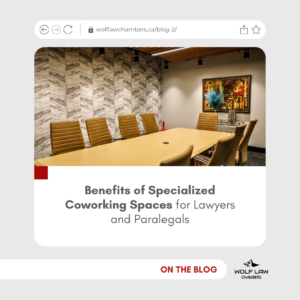Posts Tagged ‘Sole Practitioner’
Top Productivity Apps for Paralegals in 2025
Paralegals are the backbone of legal operations, handling research, drafting, and case management under tight deadlines. Staying organized and efficient is crucial in this fast-paced field. Here are the top productivity apps every paralegal should consider in 2025:
1. Clio
Clio remains a leader in legal case management software. Its ability to streamline document management, case tracking, and client communication makes it a vital tool for legal teams.
2. Notion
Notion’s customizable workspace is perfect for creating to-do lists, tracking projects, and storing case-related notes. Its collaborative features also make team coordination seamless.
3. Trello
For visual task management, Trello’s boards and cards allow you to prioritize and monitor deadlines effectively. It’s great for managing multiple cases simultaneously.
4. CaseFox
Designed specifically for legal professionals, CaseFox offers time tracking, billing, and task management. It’s intuitive and helps save valuable time on administrative tasks.
5. Grammarly
Drafting accurate legal documents is critical. Grammarly ensures your writing is clear, error-free, and professional, making it indispensable for reports, contracts, and emails.
6. Adobe Acrobat
Handling legal documents often involves working with PDFs. Adobe Acrobat’s advanced editing and signing capabilities simplify the process, keeping you productive and organized.
7. Otter.ai
Transcription tasks can eat up a lot of time. Otter.ai converts spoken words into text in real-time, making it easier to document client meetings or interviews.
Why These Apps?
In 2025, efficiency and adaptability are key. These apps help paralegals reduce manual effort, minimize errors, and maintain organization in a demanding profession. By leveraging technology, you can focus on the work that matters most.
10 Must-Have Apps for Lawyers to Streamline Their Practice
In today’s fast-paced legal environment, staying organized, efficient, and connected is key. The right apps can make all the difference. Here are 10 must-have apps that every lawyer should consider:
- Clio Manage
A leading practice management tool, Clio helps track cases, manage billing, and streamline client communications—all in one place. - Microsoft OneNote
Perfect for jotting down case notes or brainstorming, OneNote syncs across devices, keeping your ideas accessible anytime. - Evernote
An organizational powerhouse, Evernote is great for storing research, legal memos, and important documents securely. - Fastcase
A go-to for legal research, Fastcase offers quick access to statutes, case law, and more, right from your phone. - Zoom
For virtual meetings and court appearances, Zoom ensures seamless connectivity with clients and colleagues. - Slack
Facilitate team communication and collaboration with Slack’s channels, messaging, and file-sharing capabilities. - Google Workspace
From managing your calendar to sharing case files, Google’s suite of tools keeps your workflow smooth and efficient. - Notion
An all-in-one productivity app for managing tasks, deadlines, and case timelines. - DocuSign
Simplify contract management with this app that allows secure electronic signatures on legal documents. - TrialPad
A courtroom presentation tool that helps you organize evidence, exhibits, and transcripts for powerful case presentations.
Embracing technology in your practice can save time, reduce stress, and enhance client service. Which app will you try first?
#LegalTech #LawyerApps #ProductivityTools #LawPractice
The Future of Coworking Spaces in the Legal Sector
Coworking spaces have revolutionized industries, and the legal sector is no exception. As remote work and flexible office arrangements grow, legal professionals are embracing coworking spaces for their unique benefits.
Collaboration Beyond Firms
Traditional law offices can be isolating, but coworking spaces foster interaction across disciplines. Lawyers can network with tech experts, financial advisors, and startups, enabling cross-industry collaboration. This ecosystem sparks innovation in client solutions and legal tech advancements.
Cost-Efficient and Scalable
For solo practitioners and small firms, coworking spaces offer a cost-effective alternative to maintaining a private office. Flexible leases, shared amenities, and pay-as-you-go models reduce overhead while offering scalability as teams grow.
Tech-Ready Environments
Coworking spaces often come equipped with cutting-edge technology.
Adapting to Client Expectations
Clients increasingly value convenience and modernity. Meeting rooms in coworking spaces provide a professional yet accessible setting that appeals to tech-savvy and younger clientele.
As the legal profession adapts to changing work trends, coworking spaces are poised to play a pivotal role in its transformation. They offer a balance of flexibility, innovation, and professionalism, aligning perfectly with the future of legal work.
#LegalTech #CoworkingSpaces #FutureOfWork
Benefits of Specialized Coworking Spaces for Lawyers and Paralegals
As the legal profession evolves, specialized coworking spaces are gaining traction as a valuable resource for lawyers and paralegals. Unlike traditional offices or generic coworking hubs, these tailored environments offer unique benefits that address the specific needs of legal professionals.
1. Professional Atmosphere
Specialized coworking spaces cater to the professional standards of the legal industry. They provide private offices, meeting rooms, and settings that exude credibility—ideal for client consultations and sensitive discussions.
2. Cost-Effective Solutions
For solo practitioners and small law firms, renting a full-fledged office can be costly. Coworking spaces offer flexible memberships, enabling legal professionals to access high-end facilities without the financial burden of long-term leases.
3. Access to Legal Resources
Many specialized spaces provide access to tools like legal research databases, court filing assistance, and even notary services. These resources streamline day-to-day tasks, allowing teams to focus on casework.
4. Networking Opportunities
Sharing a workspace with other legal professionals fosters collaboration and networking. Whether it’s exchanging insights or referring clients, the connections formed in these environments can lead to valuable partnerships.
5. Enhanced Productivity
Designed with the legal workflow in mind, these spaces minimize distractions and support focused work. Amenities such as ergonomic furniture, high-speed internet, and secure file storage further enhance efficiency.
Specialized coworking spaces are more than just a trend—they’re a smart solution for modern legal professionals seeking flexibility, professionalism, and community. If you’re a lawyer or paralegal looking to elevate your practice, consider exploring these tailored spaces to meet your needs.
Confidentiality and Privacy Tips for Legal Professionals in Shared Workspaces
In today’s collaborative work environments, shared workspaces dedicated to legal professionals such as paralegals and lawyers have become increasingly popular. While these spaces foster networking and collaboration, they also pose unique challenges to maintaining confidentiality and safeguarding client privacy. Here are key tips to navigate these challenges effectively:
1. Be Mindful of Conversations
Avoid discussing sensitive client information in common areas. If you need to have a confidential conversation, use private rooms or designated spaces designed for such discussions. Lower your voice and be cautious of your surroundings even in semi-private areas.
2. Secure Your Documents
Ensure that physical files and documents are always secured. Use lockable drawers and avoid leaving sensitive papers on your desk unattended. When disposing of confidential material, shred it instead of discarding it in regular trash bins.
3. Leverage Technology Wisely
Use password-protected devices and enable screen privacy filters on your computers and laptops to prevent unauthorized viewing. Be cautious when working on sensitive cases in public areas, including during virtual meetings.
4. Practice Email and Messaging Hygiene
Double-check email addresses and attachments before sending. When discussing sensitive matters, ensure encrypted communication channels are used. Avoid sharing confidential information over unsecured platforms.
5. Set Clear Boundaries
Establish a clear personal workspace within the shared office. Use visual cues such as a privacy screen or headphones to signal focus time, minimizing interruptions that could lead to inadvertent disclosures.
6. Educate Your Colleagues
Regularly train your colleagues on confidentiality protocols and the importance of privacy in shared workspaces. Ensure everyone understands their responsibility to protect client information.
Shared workspaces designed for legal professionals can enhance collaboration and efficiency, but they also demand heightened vigilance. By adopting these practices, paralegals and lawyers can confidently uphold their ethical obligations while thriving in modern work environments.
How Paralegals Can Maximize Efficiency in Shared Workspaces
The shift to shared workspaces has brought flexibility and collaboration opportunities to the legal profession, but it also presents unique challenges for paralegals. Staying efficient in this dynamic environment requires strategic planning and leveraging available tools.
- Organize Your Workflow: Start your day by prioritizing tasks. Use project management tools like Trello or Asana to track deadlines, case details, and assignments. This ensures you stay on top of your workload, even in a bustling shared office.
- Leverage Technology: Equip yourself with digital tools to streamline legal tasks. Cloud-based document management systems like Clio or MyCase enable you to access files securely from anywhere in the workspace. Pair this with noise-canceling headphones to maintain focus in open areas.
- Communicate Effectively: Shared workspaces thrive on collaboration, but interruptions can derail productivity. Establish clear communication protocols with your team. Utilize messaging apps like Slack for quick queries and schedule regular check-ins to discuss case progress.
- Create Boundaries: While flexibility is a perk, set boundaries to protect your time. Reserve quiet zones or book private meeting rooms for concentrated work, especially when handling sensitive documents or client calls.
- Network Strategically: Shared spaces often bring together professionals from diverse fields. Use this as an opportunity to expand your network, gain insights, and build relationships that could benefit your legal career.
Adapting to shared workspaces is a skill paralegals can master with the right approach. By staying organized, embracing technology, and fostering effective communication, you can maximize efficiency while thriving in a collaborative environment.
Privacy and Confidentiality: Tips for Lawyers Working in Coworking Spaces
In today’s flexible work environment, coworking spaces have become a go-to option for professionals, including lawyers. These shared spaces offer convenience, networking opportunities, and cost savings, but they also pose unique challenges for maintaining client confidentiality—a cornerstone of legal ethics.
If you’re a lawyer working in a coworking space, here are some practical tips to safeguard privacy and ensure compliance with your professional responsibilities:
1. Choose Your Workspace Wisely
Not all coworking spaces are created equal. Look for a facility that offers:
- Private Offices: Shared tables may not provide the discretion you need.
- Secure Storage: Ensure there’s a way to lock up physical documents and electronic devices.
2. Practice Digital Hygiene
Coworking spaces often provide shared Wi-Fi, which can be a security risk. To protect client information:
- Use a VPN: Encrypt your internet connection to prevent unauthorized access.
- Secure Devices: Use strong passwords and enable two-factor authentication on all devices.
3. Be Mindful of Conversations
Shared spaces can make it easy for unintended listeners to overhear sensitive discussions.
- Use Private Meeting Rooms: Avoid discussing client matters in open areas.
- Lower Your Voice: Be discreet during necessary phone calls.
4. Secure Your Files
Both physical and digital files need proper care.
- Invest in Encryption: Use encrypted drives for digital storage.
- Use Secure Document Management Systems: Choose cloud solutions designed for legal professionals.
- Shred Paper Documents: Avoid leaving sensitive materials in shared bins.
5. Build Awareness Among Staff
If you work with assistants or paralegals in a coworking space:
- Educate them on confidentiality protocols.
- Implement clear rules for document handling and communication.
6. Audit Regularly
Review your practices periodically to identify and address potential risks. This includes checking for new vulnerabilities, updating security tools, and ensuring compliance with bar association guidelines.
Final Thoughts
Coworking spaces can be a viable option for lawyers, provided you take the necessary precautions to protect client confidentiality. By proactively addressing potential risks, you can enjoy the benefits of these modern workspaces without compromising your ethical obligations.
What are your strategies for maintaining confidentiality in coworking spaces? Share your thoughts in the comments below!
Embracing Flexibility: How Canadian Lawyers Can Use Coworking Spaces for Growth
In a rapidly evolving professional landscape, the legal profession in Canada is undergoing significant change. While the courtroom remains central to a lawyer’s work, the traditional office is becoming less essential. Enter coworking spaces: modern, flexible, and collaborative environments that offer more than just a desk. For Canadian lawyers, these spaces represent an opportunity to grow professionally while embracing flexibility.
Why Coworking?
Coworking spaces are designed to meet the diverse needs of today’s workforce. They offer:
- Flexible leases: Forget the long-term commitments of traditional office leases. Coworking spaces provide options to scale up or down as needed.
- Cost efficiency: Shared amenities like meeting rooms, reception areas, and high-speed internet reduce overhead costs.
- Networking opportunities: Sharing a space with professionals from various industries opens doors to potential collaborations and client leads.
For lawyers, these features can translate into tangible benefits, such as reaching new clients, improving work-life balance, and enhancing professional agility.
Key Benefits for Lawyers
- Improved Client Accessibility
Many coworking spaces are strategically located in city centers, making them convenient for client meetings. Access to professional conference rooms and private areas ensures client confidentiality and a polished impression. - Enhanced Focus and Productivity
Coworking spaces are designed for productivity, offering a mix of quiet areas for focused work and collaborative zones for brainstorming. Lawyers can concentrate on their caseloads without the distractions of a home office or the rigid structure of a traditional setup. - Professional Growth and Networking
The coworking community includes professionals across industries, from entrepreneurs to tech specialists. For lawyers, this presents opportunities to connect with potential clients or collaborators, expanding their professional reach. - Flexibility for Remote and Hybrid Work
As remote work becomes more common, coworking spaces serve as a middle ground. They offer the perks of an office environment—such as reliable infrastructure and a professional setting—without the full-time commitment.
Adapting to the Future
Law firms and solo practitioners alike can leverage coworking spaces to adapt to changing client expectations and workforce trends. By embracing these flexible spaces, Canadian lawyers can reduce operational costs, increase their visibility in the market, and create an environment that supports innovation and collaboration.
Final Thoughts
Coworking spaces are not just for startups—they’re a game-changer for industries, including law. By stepping into these flexible work environments, Canadian lawyers can redefine how and where they practice, ensuring their growth and success in an evolving world.
Let’s connect! If you’re a legal professional who has embraced coworking or is considering it, share your thoughts or experiences in the comments. Together, let’s explore how flexibility fuels growth in the legal industry.
Cost-Saving Tips for Lawyers Renting a Coworking Space in Canada.
As a lawyer, managing office space costs can be challenging, especially with rising overhead expenses. Renting a coworking space is a flexible and cost-effective alternative to traditional office leases. However, it’s important to make smart decisions to maximize savings while still maintaining a professional environment. Here are some practical cost-saving tips for lawyers renting a coworking space in Canada.
1. Choose the Right Location
Location plays a crucial role in the cost of renting a coworking space. In large cities like Toronto, Vancouver, or Montreal, prices can vary significantly based on the neighborhood. Consider choosing a location just outside the city center or in a growing area to reduce rental costs. Alternatively, look for spaces that are well-connected by public transit, saving both money and time on commuting.
2. Opt for Flexible Membership Plans
Most coworking spaces offer flexible membership options, allowing you to choose between hot desks, dedicated desks, or private offices. For lawyers, the flexibility to scale up or down is essential, especially if you’re just starting out or working solo. By opting for a hot desk or shared workspace, you can save on costs while still enjoying the benefits of a professional setting. Many coworking spaces also offer day passes, allowing you to pay only for the days you need, which can be ideal for lawyers who don’t require full-time office space.
3. Take Advantage of Shared Amenities
Coworking spaces typically offer shared amenities like meeting rooms, high-speed internet, printing services, and kitchens. Instead of leasing a separate meeting room or investing in office equipment, you can use these shared resources as part of your membership. This can save you significant amounts on things like phone bills, printing costs, and office furniture. Look for a coworking space that offers the amenities you need without paying for extras you won’t use.
4. Negotiate Your Contract
Don’t settle for the first price you see. Coworking spaces are often open to negotiation, especially for longer-term commitments. If you plan to stay for an extended period, you may be able to secure a discount or additional perks, such as access to premium meeting rooms or other exclusive facilities. If you’re a sole practitioner or small firm, discuss your specific needs and see if the space can accommodate them at a reduced rate.
5. Consider Virtual Office Services
Many coworking spaces offer virtual office services, which can be a great option for lawyers who don’t need a physical office every day. Virtual offices typically include services like mail handling, a professional business address, and phone answering. This allows you to maintain a professional image without the expense of renting full office space. It’s an especially useful solution for lawyers who work from home but need an official address or client-facing services.
6. Look for Coworking Spaces with Legal-Specific Services
Some coworking spaces cater specifically to legal professionals. These spaces may offer features like law library access, compliance tools, and networking opportunities with other lawyers. While these spaces may come at a premium, they often have tailored services that can help reduce costs in other areas, such as administrative work or access to legal resources. Look for spaces that offer industry-specific benefits, which could enhance your efficiency and lower overall business costs.
7. Collaborate with Other Professionals
Lawyers working in coworking spaces often have the chance to connect with other professionals, such as accountants, financial advisors, or business consultants. Building a network of trusted professionals can help you share costs and collaborate on projects that benefit your practice. By working together, you can access shared resources or offer each other discounted rates for services like legal research, marketing, or accounting.
8. Evaluate Long-Term Savings
While coworking spaces may appear more expensive upfront than traditional office leases, they can offer significant long-term savings. With fewer upfront costs for equipment, furniture, and utilities, you can invest your capital in growing your business. Additionally, coworking spaces often allow for easier expansion if you need additional space or services. This scalability allows your practice to grow without the risk of committing to long-term, costly leases.
Conclusion
Renting a coworking space as a lawyer in Canada can be a smart way to save on overhead costs while maintaining a professional environment. By choosing the right location, opting for flexible membership plans, utilizing shared amenities, and negotiating your contract, you can reduce expenses and enhance your practice’s efficiency. With the right approach, coworking spaces offer the opportunity to build a successful law practice without breaking the bank.
Embracing Flexibility: How Canadian Lawyers Can Use Coworking Spaces for Growth
In today’s fast-paced legal landscape, Canadian lawyers are increasingly seeking flexibility in how they work. Coworking spaces, which offer shared offices, meeting rooms, and flexible membership plans, have emerged as a popular solution. These spaces are redefining the way law firms and independent practitioners approach productivity, collaboration, and growth.
The Shift Towards Flexibility in Legal Workspaces
Traditional law offices, often associated with high overhead costs and rigid structures, are no longer the only option. With remote work and hybrid models becoming the norm, lawyers are embracing alternatives that allow for both professional freedom and the benefits of a shared office environment.
Coworking spaces provide a modern and adaptable solution, allowing legal professionals to work in a community-driven, collaborative setting while also maintaining privacy when needed. Whether you’re an associate at a large firm or a solo practitioner, these spaces are designed to meet a wide range of needs.
Key Benefits of Coworking Spaces for Canadian Lawyers
- Cost Efficiency
Traditional office leases can be expensive, especially for solo practitioners or small firms. Coworking spaces offer an affordable alternative, where lawyers pay only for the services they use. With no need to invest in long-term leases or office equipment, the savings can be reinvested into growing the practice. - Networking and Collaboration
Lawyers working in coworking spaces have the opportunity to connect with professionals from various industries. This networking potential is invaluable, allowing lawyers to form new business relationships, collaborate on cases, and even tap into new client bases. In a city like Toronto, Vancouver, or Montreal, where the legal community is large, these spaces can foster relationships that might otherwise take years to develop. - Work-Life Balance
Flexibility is a cornerstone of coworking spaces. With options to choose between part-time, full-time, or occasional access, lawyers can better manage their work-life balance. Coworking spaces also provide the infrastructure for remote work, making it easier to split time between home, courtrooms, and client meetings without sacrificing professionalism or productivity. - Access to Cutting-Edge Technology
Legal work requires reliable technology for research, communication, and document management. Many coworking spaces are equipped with high-speed internet, video conferencing tools, and printing facilities, all of which are critical for modern law practices. This means lawyers can stay up to date with the latest tools without bearing the cost of maintaining and upgrading the technology themselves. - Professional Image and Meeting Facilities
Coworking spaces often offer meeting rooms and professional spaces where lawyers can meet clients, conduct depositions, or hold negotiations. These spaces are designed to project a professional image without the cost of maintaining a large office. It’s also easier to scale up or down based on the size of the meeting or the nature of the case. - Increased Productivity
The structured yet flexible environment of coworking spaces helps many lawyers eliminate distractions common when working from home. With dedicated workspaces, access to coffee and meeting rooms, and a change of scenery, lawyers can stay focused and energized throughout their workday. This increased productivity can lead to faster case resolutions and a better work output.
How Canadian Lawyers Can Leverage Coworking Spaces for Growth
- Scalability for Small Firms or Solo Practitioners
Coworking spaces provide the ability to scale operations without the burden of office management. Solo practitioners can start with a single desk and expand to a larger space or additional meeting rooms as their client base grows. This scalability ensures that the workspace aligns with the firm’s evolving needs, making it easier to handle increased workloads. - Focus on Core Legal Work
Coworking spaces allow lawyers to focus on what matters most: legal work. The administrative hassles of managing an office, such as utilities, office supplies, and maintenance, are handled by the coworking provider. This gives lawyers more time to dedicate to their cases and clients, ultimately leading to business growth. - Enhancing Client Experience
Many lawyers find that coworking spaces improve the overall client experience. With comfortable, modern meeting areas and access to legal resources, lawyers can offer a more professional environment for client interactions. This positive experience helps to build client trust and loyalty, leading to repeat business and referrals. - Access to Legal-Specific Networks
In major cities, there are coworking spaces tailored specifically to legal professionals. These spaces often offer legal resources, seminars, and networking opportunities with fellow lawyers. By joining these spaces, lawyers can enhance their knowledge, grow their professional network, and gain insight into trends in the legal industry.
The Future of Legal Workspaces in Canada
As the legal industry in Canada continues to evolve, coworking spaces are poised to become a long-term fixture for legal professionals seeking flexibility and growth. From solo practitioners to large firms, these spaces offer the right combination of flexibility, resources, and networking opportunities to support success in a changing environment.
By embracing coworking spaces, Canadian lawyers can position themselves to not only survive but thrive in an increasingly competitive and dynamic legal landscape. Whether you’re looking for a cost-effective solution or simply want to escape the traditional office setup, coworking spaces offer a fresh path forward for growth and innovation.










